#zootopia is about racism
Explore tagged Tumblr posts
Text
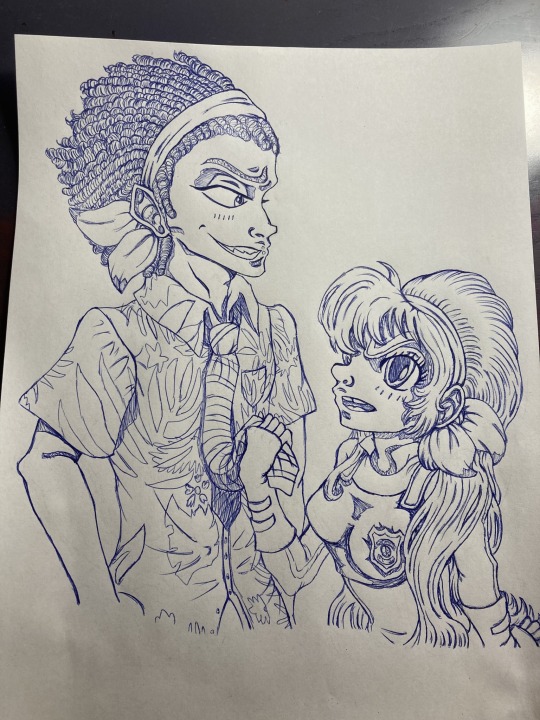







Just a bunch of humanized fanart of Judy, Nick and Finnick from last year~
#zootopia#zootropolis#gijinka#human version#humanization#judy hopps#nick wilde#art compilation#wildehopps#fanart#drawing#digital and traditional#zootopia is about racism#detailed art
3 notes
·
View notes
Text
Yk how the movie ‘Zootopia’ is supposed to be a representation of racism? And how the predators are viewed as dangerous targets due to the police saying they are? Why didn’t they get more actors of color in that movie? They, of all people, know what it’s like to be viewed as a target bc of the way they look. They should’ve definitely gotten a black actor to play Nick Wilde.
Even though I love Jason Bateman in everything he does,I just can’t help but feel like the role was best suited for a POC. Bc even one of my friends,who is black, didn’t get that the movie was about racism. And that’s because they mostly had an all white cast.
3 notes
·
View notes
Text
It’s weird to me that there’s a subset of people that want to die on the hill of Nick Wilde and Judy Hopps just being friends and not becoming a couple. Like I absolutely get it, male-female friendships are important and should be shown onscreen but also with all the allegorical context, they’d be a mixed race couple and those are important to see too.
#we interrupt your regularly scheduled programming#wildehopps#zootopia#idk some ppl get really really weird about it#and it kinda makes me squint like… is this about platonic love or… is this some weird subconscious racism?#big shrug
19 notes
·
View notes
Text
this is so me thinking out loud and deciding to blab to tumblr (rare), but it bothers me so bad when people reflexively ask if racism exists in some fantasy setting, unprompted. and its not because i think that there should never be discrimination in fantasy necessarily. imo its important to be able to navigate real life serious experiences in fantasy sometimes, but the idea that your first question upon viewing a world where there are new and exciting types of people would be "which ones do you think would be marginalized" is so unnerving to me. its not the idea of having fantasy racism that is the problem, its that youd almost kind of seek it out in that way.
this is not to mention how often fantasy racism falls terribly flat, because (AHEM... WHITE) authors miss the giant glaring main point of racism, which is that its IRRATIONAL. and they create marginalized fantasy races that pose a serious threat to the majority race's safety (read: orcs, who are portrayed as universally genuinely violent and evil and then somehow get used as poc allegory ??? stop that)
okay i think there should probably have been a conclusion to this somewhere but their isnt. uh, if you want to write narratives of oppression and marginalization in your fantasy/fictional settings make sure you dont do it in a way that makes it feel like your wildest dreams involve oppression!
#its just like. why upon seeing fantastical settings is your first question if theres racism...#this post is also about zootopia what the FUCK was that.#formatting for ease of reading not really for emphasis
46 notes
·
View notes
Text
I still can't get over how they managed to fuck up their own white supremacy allegory that had felt SO strong in the boys like how are you gonna have stormfront talking about all that white genocide bullshit as part of your allegory in the boys & then in gen v go on to frame cate & sam's actions not as something along the lines of "killing innocent humans who weren't even involved in the woods is an overreaction&terrible solution to a very real problem" etc but instead/also be like "this is part of our supe supremacy white supremacy allegory too" when there was literally a REAL supe genocide being planned out by shetty!!!
#my partner binged the season w me to distract from the horrors & it literally has me annoyed about the finale again lmao like#what were they even trying to say bcus everything they ended up doing w that part of the plot just muddies the waters of what theyve#already said on the topic#like the more you think about it the more it starts to fall apart. its like the zootopia racism allegory that falls apart as soon as you#think about the fact that predators DO kill prey so that translates pretty poorly as a race allegory#texticles#gen v
8 notes
·
View notes
Text
Antiracist movies like Zootopia and Elemental are doomed to fail at the earliest stages of their conception. If you are going to make a movie about racism, and you want the message to be that racism is bad, don't make the racial group stand-ins fundamentally different from each other. You're already on the wrong track.
Humans are humans are humans, and oppression based on ethnicity / race has no basis in logic (not to mention that race itself is unscientific, but that's a whole different can of worms). Logic is applied after the conclusion is made, because the racist is looking for evidence to support what they already believe.
But prey have a valid reason to be afraid of predators! Water and fire cannot coexist without endangering each other! The presence of this logic leads the audience to the conclusion that races are fundamentally different from each other!
Frequently these movies argue in favor of racist logic, because its worldbuilding sets up the argument that the ethnic majority is endangered when minorities coexist with them. That's not antiracist!! Why are people calling Zootopia antiracist?!
#This is mostly about Zootopia but Elemental is also relevant I think#also warning: I am a white person talking about racism#so if i'm getting something twisted then please let me know#zootopia#elemental 2023#movie discourse#critical race theory#antiracism#just rembered this one:#disney zombies
10 notes
·
View notes
Note
JFK exists in the zootopia abortion comic??
oh god. nonny i want to preface this by saying i am so, so sorry that i made you aware of this. i should have kept my mouth shut. something something today’s unlucky ten-thousand.
first off, no. jfk doesn’t exist in the zootopia abortion comic. it’s worse.
i didn’t know this until i fucking googled the damn thing but it turns out there are three parts. the infamous panel with the slap is from the first part, but the third part, published in november 2021, had some some extra pages that aren’t officially part of the comic’s canon(?) but like, same artist same universe, so ymmv.
ANYWAY.
part three. judy is the mayor. she’s married to a lady fox and they have two adopted kids. nick is also married to a lady fox and has a biological kid. judy’s fox wife is a furry version of jackie kennedy. she is wearing a pink suit and a pillbox hat.
judy sees nick one day and mentions how her mayoral platform of total integration between the predator and prey animals is mostly accepted, but has spawned some offshoot extremist groups in both directions. offshoot groups to which, i might add, there are extremely explicit nazi parallels, including splash panels of them doing nazi salutes. judy and nick say they still care deeply for one another and are both pleased that the other got what they wanted in life blah blah blah.
extra pages. judy is in a parade car with jackie canidae. in, and i cannot stress this enough, a shot for shot reenactment of the fucking jfk assassination, she is hit by a sniper and her head fucking EXPLODES in what is genuinely a really lurid blood spatter considering this is a comic based off a kids’ movie about talking animals solving crimes together.
jackie canidae is freaking out, she has blood over her pink suit, people are screaming, etc, etc. two animals, one a member of a pro-prey extremist group and one a member of a pro-predator extremist group, start arguing about which one of them shot judy.
judy then opens her eyes and sits up. she licks off the “dangerously sugary” cherry jam she is now covered in. the projectile was not a bullet, but a paintball filled with jam. the end.
now, apparently the original ending was judy actually got fucking shot. why the original artist wanted to recreate the jfk assassination is beyond me. i guess because the integration of the predator and prey animals is thematically similar to the civil rights movement? provided you squint?? ignore all the wider historical context??? up to and including slavery???
either way, allegedly the blood spatter was way worse, the comic ended like that, but the artist got so much backlash because, y’know, jfk assassination, and also possibly because judy was the one who wanted the abortion back in the first comic (remember that, nonny? remember when this was just about a weird fox-rabbit hybrid baby???) and it looked like she was being punished for getting an abortion of a child she didn't want. so the artist changed it to a weird jam-based fake-out.
once again, i would like to apologise for the psychic damage i have just caused you and anyone else who had the misfortune to stumble across this post.
#her name isn’t actually jackie canidae it just seemed appropriate considering. you know.#i don’t remember her actual name and i refuse to google this comic again to check#i know i’ve said it before but fantasy racism really is a dicey area to play around in at the best of times#for a kids’ movie just designed to teach them about prejudice it’s all perfectly serviceable#but it really does fall apart under more intense scrutiny#case in point: the predator animals used to EAT the prey animals. africans never ate white colonisers.#aj asks#hey nonny nonny#zootopia abortion comic#i am so so so sorry
14 notes
·
View notes
Text
who decided to watch zootropolis. that movie sucks and the original plot is so much better
#i believe it's called zootopia in america??#ah yes the film about a cop#and racism explained through animals#...
2 notes
·
View notes
Text
Here’s to the fall of Disney! May all their past sins grab them by the ankles and drag them to hell!

awesome
#bet you wish you didnt trash the gay movie huh idiots#violetta’s reblogs#nah cause sometimes they even suck when it comes to messages about racism#why are almost all of the movies centered around poc#turns the main character into a animal#not to mention the stereotypes they enforced in zootopia 💀#and the homophobia#AND THE ENTIRE MULAN LIVE ACTION#THEY HAD ONE JOB ON THAT ONE
17K notes
·
View notes
Text
I've never really thought about putting representation in my dragon book all that much, because they are dragons and some allegorys just won't work if not done with humans and such but. For not thinking about it at all, I sure have managed to make most of the main characters family disabled in some way. Like. 3-4/6 siblings have some disabling affliction. I just sort of forgot that it's still technically representation even though it's not the main focus of the character. Perhaps that many is a little overboard, but frankly I don't care and they've had these for years and I don't care to adjust the characters now.
But ig if anyone is curious as to what disabilities, the main character is blind in one eye, there's twin brothers and one is fully blind and the other is mute- and another sibling has a degenerative illness (they all inherited it) slowly working its way into their brain.
Child me didn't understand the concept of "representation" and just thought it was fun to make a character with something that changes the way they live and give myself something to write around.
#i think im going to avoid all racism allegorys#they are dragons and im not about to pull a zootopia#movie was nice and all but yk. when you're dealinf with actuak species? the racism thing sorts falls flat#doesnt translate quite well#also theres actual humans in the book so why would i shoe horn it into dragons?????#wont tag this properly bc its just a little info dump but whatever yk#anyway yeah maybe i habe TOO much disability rep. they are all disabled in some way at this point#gonna get angry right people calling the book woke bc of it lmao#bc clearly the mere existence of all that is woke propaganda! lol
1 note
·
View note
Note
So I thought of something. In certain media when talking about racism through allusion, they often chose to use animals to represent people which some work and others doesn't.
For example Zootopia (and Aggretsuko but it doesn't talk about that) yes there's racism between the herbivore and carnivores, but they have to be together with those similar to themselves. After all, a rabbit can only mate with a rabbit, all the couples are with someone of the same species, and they can't cross breed. So the message is kind of lost. I'm not saying I want Judy and Nick babies at all especially as they are stated to be the animals they are just further evolved. If one could say rabbits represent farmers and foxes represent conmen, and them being different from the expectations it has painted itself into another corner with everyone else of their species being what they're expected to be and when it comes down to it, the only one they can be together with is someone of the same anyway. "gamers can only date gamers" "but he doesn't like games" "but that's what he's expected to be!" it doesn't really work. If one with them representing different nationalities, and go "rabbits are the Chinese and foxes are Italians" yet again it becomes "different people shouldn't mix" which is a terrible message.
But for example Tales of Rebirth and Digimon Frontier manage it in my opinion. In ToR, huma (human-like) and gajuma (animal-like) can crossbreed, weird as it might be, but it works storyvise, it also talks about the difficulties of those caught in-between. In DF Human Digimon and Beast Digimon have many conflicts. None can breed (as new Digimon are made from data anyway and reincarnate when killed) but they can romance. So the reason the digital world is in trouble is because Seraphmon and Ophanimon, two human Digimon fell in love, but Cherubimon was also in love with Ophanimon. As the 3 are the rulers of the digital world, and Cherubimon was outnumbered as a beast and jealousy he became paranoid and betrayed the other two and the conflict became worse. Neither are perfect but still manage pretty well compared to Zootopia.
Honorable mentions to Inuyasha, Orange Marmalade*, Tales of Symphonia, and Days of Hana* which manage pretty well too, but not perfectly either..!
*both webtoons
Just some random thoughts I had..!
Hi anon! I haven't watched half of the series and webtoons you mention but I think yours is an interesting point of view so I'll leave this here in case anyone has an opinion on it :)
0 notes
Text
I just watched Wish (2023) and it made me realize something kind of sad about Disney’s treatment of villains.
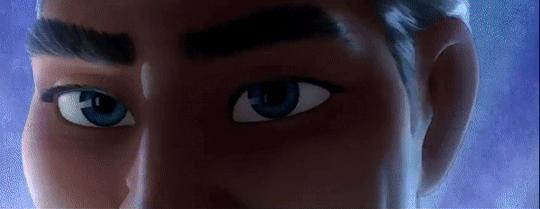
So Disney has a long history of villainy from the OG Evil Queen who is willing to murder a girl just for being pretty to the misguided like Auto thinking he’s protecting humanity in Wall-E. They are mean, jealous, prideful, vain, and many relish in just being the worst of the worst. However every now and then we get a glimpse of more complexity. Zootopia’s Bellwether dealing with years of racism and mistreatment, Gantu trying to stop what he thinks is a monster in Lilo and Stitch, Up’s Muntz being a heroic explorer before paranoia consumed him, etc. The thing that makes me sad about these villains is that not one of them has ever had a chance at redemption or change in Disney’s eyes and nowhere is that sadder to me than their latest villain, King Magnifico.
(Spoilers below)
King Magnifico is the magical founder of a utopian society that accepts people of all races, religions, and backgrounds. Who created this wonderful place after what is heavily implied to be a violent invasion destroyed his homeland when he was but a child. This past trauma led him to study magic and become a powerful sorcerer so that nothing could hurt him or the people he cared about ever again. His magic is a protection that he extends to all who choose to live in the city. The city is vibrant with a colorful community full of artisans, musicians, and dancers. He takes no taxes from them, but does take their one true wish upon joining this society.
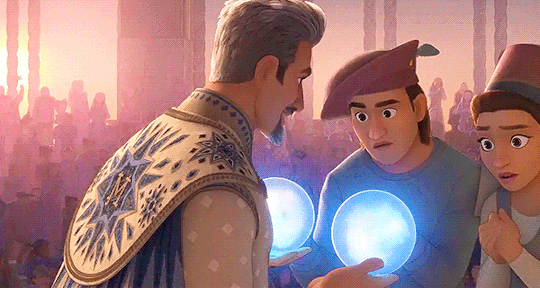
When given these wishes it is understood that he will ensure their safety and possibly grant them one day. Something important to note about the physical manifestations of the wishes is that they give off a warm and comforting aura as they represent some of the purest parts of a person’s soul. Magnifico has been surrounding himself with this magical comfort for a very very long time by himself and I don’t think it’s unfair to say he has become addicted to their presence. The wishes are giving him a magical comfort through the kind souls within them, a feeling he could’ve probably also gotten if he had spent more time with his people.
It doesn’t look like he ever really got the chance to commune with his people properly because somehow the society kicked off on his wish granting abilities. People had to give him their wishes if they wanted them granted and eventually the ones that he couldn’t grant in good conscience or out of fear started adding up so he began locking them away. Keeping them safe so no harm came to the people. The rare occasions that anyone else interacts with these wishes is during wish granting ceremonies that the people are borderline rabid for. With good reason, it is their souls they’re thirsting for after all even if they don’t really know it.
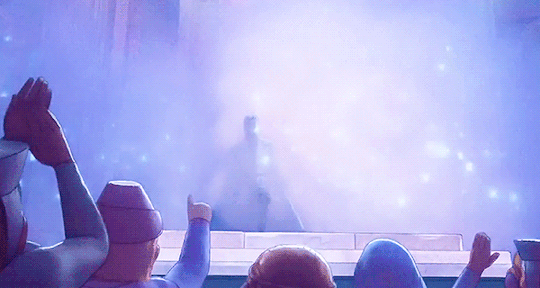
However, Magnifico clearly doesn’t see it that way. He sees it as he’s given these people a wonderful safe haven from the horrors of the outside world where they can be whoever they want to be, do what they want to do, make what they want to make, and still all they see in him is a tool to fastpass to something else they want even more than the peace he’s given them.
This is clearly shown early on, before any of his evil behavior starts to take root, in relation to his assistants. We get a expo dump after the first song telling us that Asha wants to become one of his assistant to increase the odds of her grandfather’s wish being granted as there is a correlation between past assistants and having wishes granted. Something important here is that there have clearly been many assistants, suggesting that it’s a revolving door position without really explaining why. Who would want to keep finding assistants over and over again, when really you should find someone who could do the job long term right? Well we get to find out the likely reason when Asha steps up for the role.
When Asha comes to interview for his assistant position he sees she is nervous, he tries to calm her down, and he even manages to relate to her through fond memories of her kindly father who he clearly knew. After seeing her true resolve to do good he decides to trust her with something few people in the entire kingdom get to see, the vault of wishes. To which Asha doesn’t even hesitate to ask, after politely being told not to prior, if he’ll grant her grandfather’s wish.
Magnifico is blatantly stricken by her request, sadly remarking that most people at least wait a few months before doing so a.k.a pretend to be interested in helping him rather than trying to use him to grant a wish. This is likely why the assistant job is a revolving door. Magnifico tries to find someone who he thinks will truly and selflessly fulfill the role only to discover time and again that people are just using it to get direct access to him to ask for a wish. Then he can’t trust their true intentions anymore and moves them along.
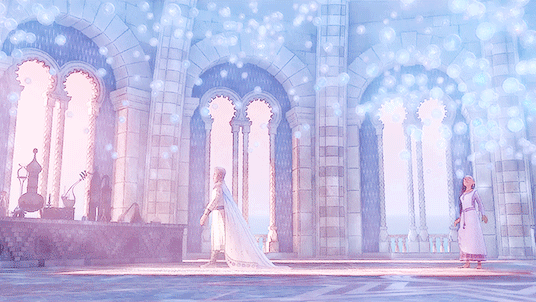
After Asha makes her request he does take the time to look at her grandfather’s wish but dismisses it as too dangerous because it is the vague desire to inspire the next generation. Clearly we as the audience know that her grandfather means to inspire them to do good, but we have to remember Magnifico has seen the worst of society. He has seen the darkest wishes and desires of mankind and survived them. He brushes Asha off telling her she’s too young to understand, which is honestly true. She’s lived her entire life cloistered in peace and comfort thanks to him and the rules he has made. She has never had to know war, strife, or hardship thanks to him, yet she doubts his decision without understanding the trauma that guides it. This is what I believe pushes Magnifico into his villain arc, something that I don’t think we’ve ever really witnessed in a Disney movie.
Usually a villain already is the villain by the time the film rolls around, even the twist villains. Lotso had already been deliberately sentencing other toys to torture. Prince Hans was already planning to murder his way to a throne. Evelyn was already plotting her revenge. Magnifico wasn’t though. He was the hero. He had saved his wife and a whole city’s worth of people from whatever drove them from the mainlands. He wasn’t physically abusing/mistreating people like Gaston even if he was vainly basking in their adoration.
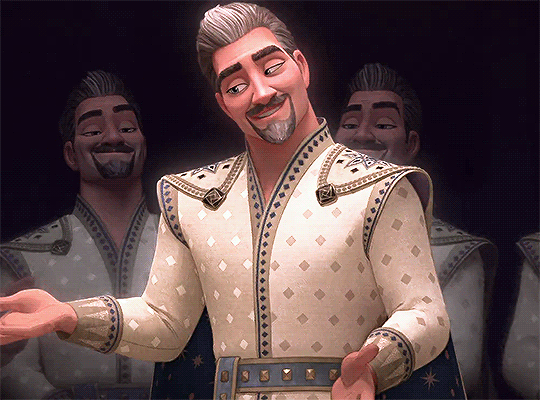
When Asha pushes him on the wishes he pulls back from her, identifying her in his mind as a threat and treats her as one. He dismisses her and tells her that her family’s wishes will never be granted by him, but he will still keep them safe as he has been doing. Essentially meaning nothing will change for her from what it has been. You know a happy loving existence of complete acceptance and wholesome family life or as Asha interprets it, a fate worse than death.
His interaction with Asha triggers him, as she’s pushed at the flaws in his reasoning for holding onto the wishes. The flaws are true, but his mind is clouded by fear of a lack of control, likely stemming from the horrors he witnessed in his childhood when he had no control. He also likely has a bit of an addiction to the warm fuzzies that the wishes give on top of his fears. While he’s ruminating on that some massive wave of magic blows through the kingdom and messes with the thing he’s already stressed beyond reason about, the wishes.
Magnifico frantically searches for any answer, even considering a dangerous tome of forbidden magic that he knows is trouble before his wife manages to talk him down.
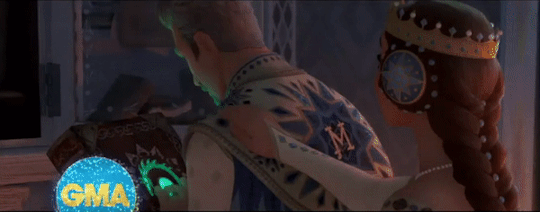
The fact that he could even be talked down rather than ignoring her outright shows that Magnifico does have good in him. He’s just reacting out of a genuine panic. His panic is only worsened by huge mob continuing to beg him for wishes in exchange for doing what should be the selfless act of defending their kingdom from what is essentially perceived as an attack. Not having any faith left in his people he turns back to the evil book to give him the key to stopping this perceived attack.
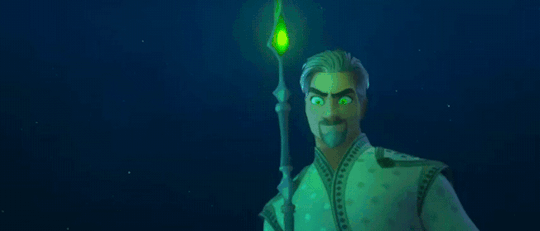
Just to be clear King Magnifico goes to the big bad evil book not to gain more power for funsies, but to try to find a way to stop a perceived threat. Everything he does from this point on, such as threatening his wife, can no longer be fairly tied to him, because as the movie repeatedly tells us he is under the EVIL book’s influence. His wife even looks through the same book to try and see if there is a way to break the sway she knows it has over him, but says she can’t because the EVIL book said no.
Yada yada yada and Magnifico is sealed inside a magic mirror and smugly told to rot in the dungeon by his previously loving wife.
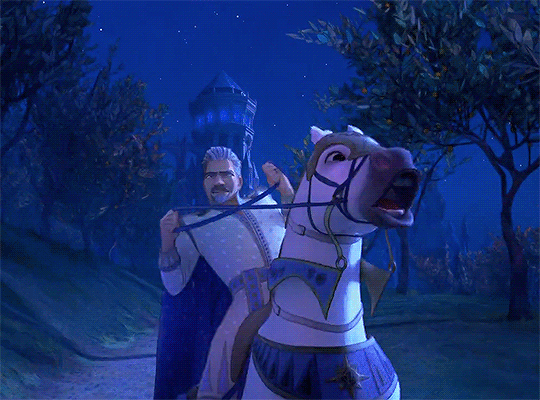
Seriously?! What the heck?! This guy was the perfect candidate for rehabilitation. He wasn’t flawless, but he wasn’t a murderous psycho like most of the other Disney villains. Disney loves to preach kindness, acceptance, and good will with their heroes, but never does it allow the message of change.
I was shocked going back through the catalogue and slowly realizing none of their villains, regardless of how tragic their origins are, are ever truly allowed a second chance. The hero may offer it, but the baddy never is truly expected to change or reform. Which is honestly super messed up to me. People make mistakes. Some can be small/insignificant, but some are big and do hurt people sometimes. That doesn’t mean they can’t change for the better.
Now I’m not saying every villain is redeemable or good, it’s just a bit surprising that for all the messages of kindness and acceptance we haven’t really gotten forgiveness in 100 years. Seeing the “bad guy’s punishment” just deeply bothered me this time. Probably because so much of the bad that Magnifico does is clearly a trauma response and as a punishment for not acting appropriately to said response he gets sentenced to eternity is magical cell.
#disney wish#wish 2023#king magnifico#wish magnifico#magnifico x amaya#queen amaya#amaya#wish king magnifico#wish asha#disney villains#100 years of disney
951 notes
·
View notes
Text

One of my big personal hang-ups with Kevin and Kell is that it's about animal people, as a vehicle for jokes about animal people. "If a rabbit married a wolf that'd be fucked up" as a premise for jokes. And that's fine, it's never pretended to be anything else and that's a perfectly cromulent premise for a funny animal comic.
But in the decades it's been running there's been stuff like Zootopia presenting "Carnivores vs Herbivores" as a metaphor for racism, Beastars as a metaphor for sexual assault, and a million furry comics presenting furries as a metaphor for any number of oppressed real-life social groups. And this shifting cultural context has really poisoned my reading of Kevin and Kell.

Like there's an ongoing storyline about a tiger living in a rabbit community who's disguised as a rabbit and trying to live a normal rabbit wife but at some point he needs to tell his girlfriend. And I keep reading it going "It this a metaphor for a white-passing POC? Is it about religious minorities dating gentiles?". And if you think about it that way a lot of the comic reads weird because the comic keeps emphasizing that carnivores really do eat herbivores on the regular and that's a weird thing if they're supposed to represent-.
But...no. It's about a tiger disguised as a rabbit. He's a tiger. It's a metaphor for him being a tiger. He's not a minority, he's a large cat. Hal, it's about cats.
156 notes
·
View notes
Note
Tell me every reason you enjoy Zootopia enough to give it all the rewatches you do.
Every? Oh boy.
Good Story
Perfect Characters
Visual Appeal
Earnestness
Let me break it down.
1. Good Story
Zootopia’s main point is: “Try to make the world a better place by realizing we’re fundamentally the same.”
That’s a really good main point.
It has the benefit of being true. Right now our culture is super into “self-identification,” and this crazy contrast between, “I want to be able to identify as something special” and “Now that I know what categories I fit in, I can choose who’s ‘one of us’ and who’s ’not one of us.’” Okay well that sounds pretty and I’m sure it fulfills some emotional need at some point, but it’s actually super divisive, and self-serving, and it’s the seeds for all prejudices. Including racism.
Do we have differences in origins and experiences? Yes. Of course. Do we also have some fundamental things in common? Yes. Of course. Which truth are you going to give the highest priority to? If it’s “no, I’m a prey animal, I know exactly where I belong, that’s who I am, that’s how I dress, that’s my compass for how I interact with others” then you’re getting all your security from your “sense of self,” and being able to understand what that is…which is just a fancy way of saying “I’m all about me. My own perspective informs everything I do.”
Anyway. Zootopia’s message was super true.
And the coolest thing about it is that if only Judy were in the wrong, and the other half of the dynamic duo, Nick, was this open-minded, un-prejudiced guy…and she just hurts him and has to apologize…the movie’s message wouldn’t be as well-communicated.
They have their prejudices and their hurt-from-being-prejudiced-against in common!
They’re the same…because they’ve both felt what it’s like to be treated like they’re not “the same.”
Nick isn’t the only character being mistreated and written off because of his species. The whole first half of the movie is about Judy being mistreated and written off. They think she can’t be a cop because she’s little and cute and a prey-animal. They think Nick can’t be trustworthy because he’s sneaky and small and a predator.
So literally…if Judy represented one race, and Nick represented a completely different race…the movie would be saying that both those races are discriminated against. They even have discrimination in common. AND, if Nick represented men who people make assumptions about because he’s a man, and Judy represented women who people make assumptions about because she’s a woman—the movie would be saying that both those genders are falsely judged.
I mean. Wow. Right now, your movie is either pro-woman or pro-man. Right now, your movie is either BLM or white-supremacy. Everybody’s lining up on one side of the line or the other. Zootopia says, “it doesn’t matter what character you’re looking at, from the elephant that can’t remember anything to the two main characters—every single one of them has fundamental things in common, and one of those things is that they all live like they’re in their own special category. When actually, they’re all fundamentally the same.”
I don’t want to keep beating the dead horse. But I have a post somewhere that lists every background character and points out that each animal is the exact opposite of what you would assume they are based on their animal-stereotype. The otters are never shown being playful or snuggly, only traumatized and ferocious. The cheetah is fat and slow, not quick or even quick on the uptake. Etc.
Even if you look outside of characters—look at the sets. Look at the environments. The whole city is designed “for animals, by animals.” But it’s in neat little segments. The animals organize themselves by habitat. Of course, in one sense that’s practical—the polar bears can’t live in Sahara Square, etc. but the point is, by making Judy and Nick, the main characters, small animals, in a city where everything is built to accommodate by species—UGH this is so good—they have to figure out how to problem-solve in situations that weren’t made to accommodate them.

Little Rodentia? Judy has to avoid stepping on all the mice or knocking over their buildings. Parking tickets? She has to figure out how to jump to reach bigger animals’ windshields—or she inconveniences smaller animals because the tickets are all printed at the exact same size. Stuck in a cell? The guards didn’t think about the fact that small animals can fit down the pipes made to accommodate big animals.

Zootopia is a city advertised to be where all the animals can come together. But the way they do that is by trying to accommodate every species’ preferences. So then actually while they try to come together, everything from their cars to their districts remind them of their differences. The whole idea is that they prioritize the wrong truths. Yeah, mice can’t drive giraffe cars—but they still have “driving” in common. See?
And oh my word. Initially it was supposed to be a spy story. But they changed it to a buddy cop story. Why? Well because justice doesn’t discriminate. Or at least, it’s not supposed to. So then there’s another lens to look at the story’s main theme through.
It’s just that every layer, every perspective you look at the movie from, is just hammering that truth into you: “Try to make the world a better place by realizing we’re fundamentally the same.”
2. Perfect Characters
Every character is so well-thought-through in this movie, even the side characters. You get the feeling you could watch a whole movie based on the side characters, because that’s the amount of love and nuance built into them.
Look at the main ones, though. Bellwhether is supposed to be soft and a follower. She’s a sheep. Instead, she’s hard and bitter—and she’s a leader. A villainous leader, but a leader, nonetheless. Even as she tries to keep animals divided based on fear of their stereotypes, she’s not fitting her own stereotype. Her voice actress has this strained, half-hoarse, but sweet voice. Like you can tell that this character has spent a lot of time under pressure and trying to manage appearances. Appearing like she’s fine, and she can handle it—until you realize that the appearance she’s really managing is “the cultural fear-based identify of the city.” They dress her in plaid and flowers and she’s a farm animal, because that’s the kind of character Judy would be most likely to trust. But she still has green eyes, and jagged teeth, so that when she does start making evil expressions there are some caricature-pieces in there that come out and accentuate that.

Nick Wilde—everybody’s favorite—is supposed to be sly and smooth and shifty. And he is. He’s a fox. But he’s also brave, helpful, and trustworthy. The first time you see him is when he’s dodging out of the way of a bigger animal ignoring him and about to run him over. Well, that’s important.

Because Judy knows what it’s like to have to get out of the way of larger animals, because they overlook her.

So right off the bat, this character she has to get along with and work with, this character who furthers her development and nails the main point, is introduced in a way that has something in common with her. But he’s also introduced in a way that gives her an opportunity to focus on a different truth—that he is different from her. Because the sheep is yelling that he’s a “fox.” Right away, we’re back to species-as-identification.
And that’s what the movie does, all the way through. It presents new animal characters, and with those new animals characters, more than one thing is true at a time. And Judy has to try to focus on which truth is more important. “Try to make the world a better place by realizing we’re all the same.” Yes, Nick is a criminal. But Nick is also brave, helpful, and eventually, becomes trustworthy.
Judy, too. Judy is an incredibly well-done character. Because she believes, in her head, that anyone can be anything—which is not what the movie ends on. In fact, she goes from saying, “anyone can be anything,” to saying, “we all have limitations.” It’s not true that a fox can be an elephant. But it is true that a fox can be trustworthy. Figure out what’s true, and try to make decisions for the better, based on that.
I could talk about character design and acting. Ginnifer Goodwin gives just the right amount of smugness and self-confidence to Judy without making her unlikeable—you don’t realize she’s smug and her self-confidence is misplaced until she does, when she fails to make the world a better place for Nick.
Judy wears tight, actionable, well-fitting uniforms for the whole movie. In her civilian clothes when she comes to Zootopia, she’s wearing athletic t-shirts and shorts. Ready for action, that’s Judy, even in her civvies. Meanwhile, Nick? Nick wears loose-fitting clothes. Loud, patterned clothes that don’t match. Like he didn’t even what, ladies and gentlemen? Like he didn’t even TRY. “Try to make the world a better place…”
Because when you meet Nick Wilde, he’s long since given up on trying, in life. So his character design reflects that. He rarely even stands up straight, or opens his eyes all the way—his default is drooping. And guess what?
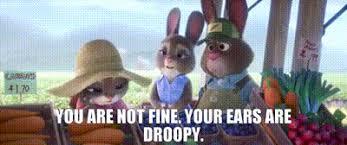
When Judy “gives up?” Quits her job? Goes back home? Stops trying? Her civvies aren’t ready-for-action, trying clothes. They’re loose flannels. And her “ears are droopy.”
SERIOUSLY, you can find things like this in every corner of the movie. For every character. Not one character is a throwaway, not in voice acting, not in design, not in animation, and not in narrative.
3. Visual Appeal
Which leads me into this point—no other animated anthropomorphic animal movie is as visually appealing as Zootopia.
What Zootopia does is it matches the best of the best anthropomorphic animal designs from past Disney movies:
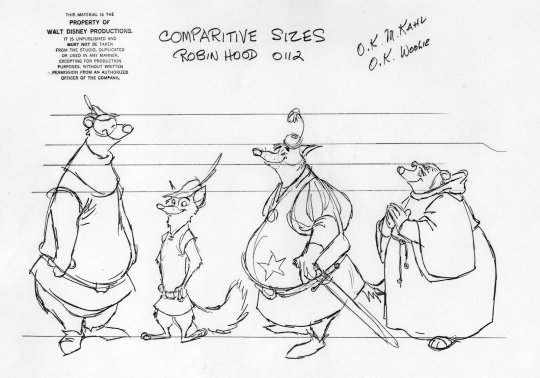
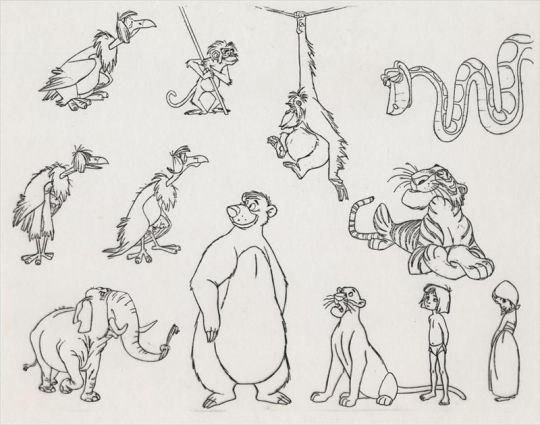
And they marry it with this incredible intentionality with modern CGI.
Did you know Disney invents its own software for things like fur textures?
The sheep’s wool, the velvet pig skin, the fox fur, the bunny fluff—it’s all completely different textures. There’s no one “fur” covering all the hairy mammals.
Nick isn’t just orange. He’s orange with deep red and dark tufts. Judy has black tips to her ears, too—which helps the two of them look like, in some sense, they belong “together” in every shot.
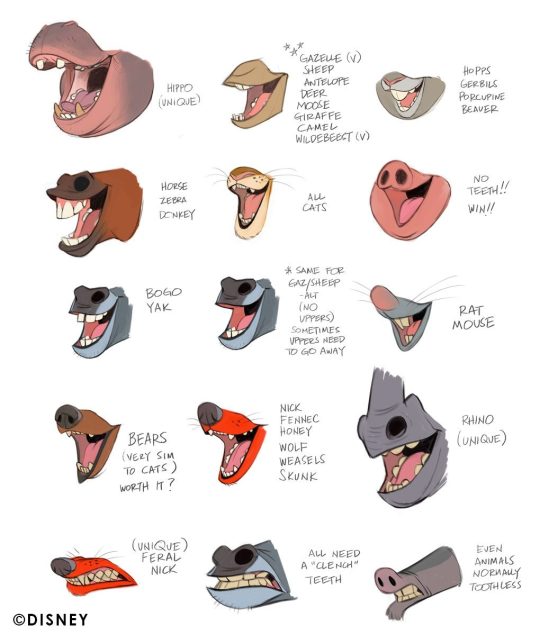
It’s so important to the movie that the animals feel like animals that they worked this hard to do this. And then that extends to the textures of the snow, the ice, the sand, the wet leaves, the grass, the fire.
Every character moves like their animal, and like themselves. Nick and Gideon are both foxes, but they don’t move similarly at all. Gideon is aggressive and glowering and physical. Nick, again, is slouchy, leans on everything, completely non-confrontational.
Other anthropomorphic animal movies like Sing or Puss in Boots—they’re not doing both as well. Zootopia is appealing, without sacrificing realism completely, and without cutting character acting.
The lighting. Nope. This post is too long, I can’t talk any more.
4. Earnestness
There is no disingenuous moment in this movie.
The animators are never lazy. They always go for the challenge. They don’t cut corners. Have you ever seen “Over the Hedge?” I like Over the Hedge. But I watched it recently and it’s crazy how many shots are strategically placed so that the animators don’t have to solve a certain effects problem.
For example, when RJ sprays Hammy with cool whip to make it look like he has rabies? He doesn’t. You never see the cool whip leave the can. It just cuts away, then cuts back when RJ is pulling the can away from his face. The shots are also cut so that you never have to see gas actually come out of Stella—and you never see Vern’s full body as he gets back into his shell, just the upper part of the shell as he wiggles it around, going through the motions of putting it back on.

That’s because that stuff would be painstaking to animate. Any time one character has to interact with props or substances (especially liquids) that are not part of their model, it’s harder on the animator.
Zootopia? We’re getting full-on views of characters getting wet, fur and all, characters touching various objects and elements, foam coming out of the mouth, new clothes, new set pieces, multiple models, huge crowd shots of different animals in different outfits, all with their own movement patterns and acting.


And all that hard work and effort, aimed so totally at the main theme of the movie? Making sure it looks as good as it can? Not just that, but the way it’s written, the acting, is so genuine. They don’t hold anything back. They don’t shy away from real emotion.
Judy Hopps’ apology scene is brutal. She’s crying, having a hard time finishing a sentence, her voice is all tight. It’s not pretty, it’s not romantic, it’s like…ugly crying. And her character is wrong in a super embarrassing way. They're not afraid to go there. The writers, the actors, the animators—they’re not afraid of being too vulnerable with these character flaws.
So many movies, especially kids’ movies today—they just pull up and shy away from being real through their characters. They think a quick sad facial expression will get the point across. And it does. The audience gets that the character feels sad about whatever the circumstance of the scene is. But not as powerfully. Because you didn’t put as much work and heart into it.
Zootopia is all heart, from work ethic to vulnerability to the filmmakers enjoying what they’re doing, enough to make it as good as it can possibly be. I can’t explain it better, other than to say, you feel like they would’ve been happy making this movie much much longer than it was. You feel like they’re cramming every bit of joy and passsion into every little joke, every side character, every hair on a CGI bear.
There you go. Long post, you did ask for it
#Zootopia#Nick Wilde#Judy Hopps#Zootopia appreciation#anthropomorphic animals#Fox#bunny#Disney#Zootopia 2#Jason Bateman#ginnifer goodwin#byron howard#meta#character analysis#design#over the hedge#puss in boots#sing#movie#animation#character design#character study#critique#review
189 notes
·
View notes
Text
Animals as allegory

Zootopia has the common fallacy of animal allegory fiction that altho its message is one thing (“racism/misogyny are bad”) everything else about the universe runs contrary to that because there actually are essentialist differences between animal species.
Something you notice about Robin Hood is that, for the most part, there’s no rhyme or reason to how the animal-people are distributed except for maybe “big ones tend to work for the state” (e.g. rabbits and mice are peasants while crocodiles and rhinos are guards). But even then, the Sheriff of Nottingham (a wolf) is the same size as the Little John (a bear).
Whereas in Zootopia, carnivores are supposedly unfairly discriminated against, except that there’s a good reason if you stop to think about it. For a zebra, it doesn’t matter how many good lions you’ve met in your life: they all do have the capacity and perhaps desire to eat and kill you while you have no equivalent desire or real capacity to hurt them.
In reality, a Black person is not actually essentially different from a white person.
But in the anima allegory, the fear of being eaten by larger species that apparently evolved over millions of years to hunt and kill you is being treated as equivalent and supposedly equally irrational to racism — except that at the literal level and for the prey animals, it is rational.
So if you’re going to have animals represent essentialist qualities, particularly in exploitation or harm, the allegory can’t be of the one-to-one “racism is bad” sort without implicitly making fundamental arguments for racism.
You might be able to make class-based critiques but solely because we don’t tend now to have anyone believe that being rich is an essentialist characteristic inherent to them. Instead it can be an allegory for that conflict:
youtube
A longer (better) exploration of this was done in Jack Saint’s video essay series about Zootopia and similar animal allegories, such as Beastars:
youtube
However, in this moment, it may just be enough to say that, even under the context of feudalism, protagonists who fight against law enforcement as venal enforcers of an unjust system is a much more resonant message than one where people aspire to be cops enforcing and upholding unjust systems.
Whatever criticisms there are of Robin Hood for its assumptions that “monarchy is good, actually”, it does entirely fit with the setting that Medieval peasants would reject a “bad king” in the name of a Good King Richard. And considering that character appears for all of two minutes at the end, the overall impact seems to be anti-tyranny, the necessity of wealth redistribution by any means when the alternative is people starving, and an acknowledgment that truly ethical behavior is a standard that supersedes whatever is deemed illegal by the powerful, particularly when it challenges their power.
Sometimes it’s a bigger crime to follow the law.
#in this essay we have...#zootopia#robin hood#beastars#allegory#jack saint#animals as allegory#Youtube
165 notes
·
View notes
Text
Just getting done from watching Elemental, and I am so happy that I decided to watch it opening day. Not just because the beautiful visuals (which the promos don't do justice over; more on that later*)... or the creative concepts about the way different elements interact with each other and their environment... or the absolutely adorable interactions between Ember and Wade. But most of all the key theme of the story.
Now it'd be easy to think that this is just another fantastical star-crossed lovers story. Or another derivation of Zootopia in regards to a racism allegory. Which... again I'll get to that later.*
But honesty, while the theme of racism (interactional and structural) was interwoven through the story and the romance was the key plot driver, what really stands about that film wasn't those factors (as still as wonderfully done as they are; especially the theme of fire and water being able to touch).
What stood out was the central theme of being the child of immigrants and the expectations that come with it. Especially when those immigrants who are the vanguard and keystone of their communities. And especially when you realize that it's a personal story from Peter Sohn and many of the folks who worked on it; the same way that Turning Red is a personal story from Domee Shi (it is notable that Pixar has been really great at platforming creator stories).
*But you wouldn't know that judging by what scant marketing there was (which doesn't exactly dissuade my suspicions that Disney seems to be doing its damndest to kneecap Pixar).
Anyways, I highly recommend it. And if you're on the fence about watching it, I suggest not getting discouraged by said shitty marketing or naysayers who haven't seen it.
678 notes
·
View notes